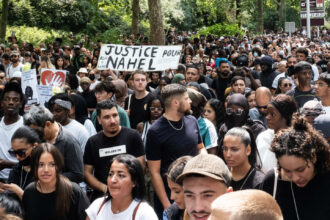The first time I went on a foreign mission – “OPEX,” an overseas operation in French military jargon – was in Côte d’Ivoire. I went there with the army for a four-and-a-half-month mission in 2005. I was 25 years old at the time and had just graduated from l’Ecole Militaire de Haute Montagne, a selective school for non-commissioned officers.
Once on-site, we first had to secure an airport. Then we switched to other missions, especially convoy protection. Road pirates were rampant in the region. They were killing motorists before robbing them. In the army, we’re trained for war, but that’s when I realized how brutal the on-field reality was. Those pirates were not only killing and looting, they were also cutting off their victims’ hands, especially those of the village chiefs, to sell them for cannibalistic purposes. This mission definitely had a sordid side to it. We were never able to catch the criminals, but they were arrested by the next batch of French soldiers.
“I grew up in a village where the elders would tell stories of their military service, and I enjoyed listening to them”
I found that first foreign mission very gloomy, obviously, but it didn’t trigger anything in me. I told myself that it was the nature of the job. Since I was very young, the army attracted me. I grew up in a village where the elders told stories about their military service, and I enjoyed listening to them. The action, the spirit of rigor and the notion of commitment are all aspects of the profession that fascinate me. But what I didn’t know was that, six years after my first overseas operation, another OPEX would trigger my post-traumatic stress disorder (PTSD), which is now part of my daily reality.
OPEX in Afghanistan
After the operation in Côte d’Ivoire, I was able to return to civilian life and to complete my preparation for other external operations: In New Caledonia (a presence operation) and in Norway (as part of NATO training). Then, there were the foreign missions in Afghanistan. From 2009 to 2011, they were spread over two assignments – the first lasted five months and the second seven months – aimed at ensuring the protection of the population on the ground. During the second mission, one of our duties was to secure a strategic road in the Kapissa region. It was at this point that my PTSD was triggered. I was leading a group of 15 men tasked with protecting soldiers who were scouring the ground to locate and deactivate “IEDs” (improvised explosive devices). Nearby, we could see old Russian tanks dating from the 1980s war.
You have 62.92% of this article left to read. The rest is for subscribers only.
Read the full article here











